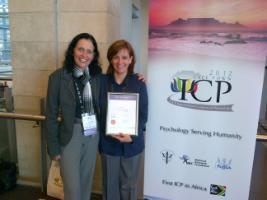
Tracey Feltham-King, a PhD student in the Psychology Department, won the PsySSA/Discovery student presentation award at the International Congress of Psychology held in Cape Town from 22 to 27 July. This congress, held every four years, attracted in the region of 5 500 psychologists from around the globe. Ms Feltham-King’s presentation, entitled ‘The significance of gender in the abortion debate as represented in the South African newsprint media from 1978 to 2005’, drew off research conducted within the ambit of the Critical Studies in Sexualities and Reproduction research programme in which Rhodes was awarded a SARCHI chair earlier this year.
Ms Feltham-King asked the following questions in her presentation: 1. What is the gender of those called upon to comment on abortion in the newsprint media? 2. From what position (pro-choice or pro-life) do these commentators contribute to the abortion debate? 3. Is there a relationship between the gender of the commentators and their alignment to the abortion debate? Presenting data from a content analysis of South African newspaper articles written on abortion from 1978 to 2005, Ms Feltham-King indicated that there was a balance of male and female commentators drawn on to express an opinion on abortion, and that there is a balance of pro-life and pro-choice positions expressed by these commentators. (While acknowledging that the bifurcation of positions into pro-life and pro-choice obscures the complexity of the debate concerning abortion, previous researchers and Ms Feltham-King found that the media tends to portray the debate as a clash of absolutes). This kind of balance (gender and position) was maintained both during the Apartheid era and after 1990, when transformation started.
What was particularly interesting about the presentation was that once the gender of commentators and their alignment to the abortion debate was cross-tabulated a statistically significant relationship emerged. Of articles with a female only commentator, 67.1% of the commentators took a pro-choice position, and only 21,5% took a pro-life position. Of those articles which contained male-only commentators, 54.3 % of them took a pro-life position and 14.9% took a pro-choice position.
In order to make sense of this Ms Feltham-King drew on the notions of descriptive and substantive representation. Descriptive representation refers to the presence (actual numbers) of women in institutions (such as the media). Substantive representation refers to the inclusion of women’s interests or preferences being represented in that institution. Research has shown that the relationship between descriptive and substantive representation is complex and depends on the gendered institutional context in which it occurs. Ms Feltham-King’s research shows how descriptive and substantive representation are intimately interlinked in the area of abortion which, she hypothesised, has to do with the embodiment of reproduction.
Photographed next to the ICP banner are Ms Feltham-King and her supervisor, Prof Catriona Macleod. Prof Macleod indicated that Ms Feltham-King is an excellent student who deserves the accolade she has received. A different aspect of the same project has already been published in the journal Culture, Health & Sexuality.
